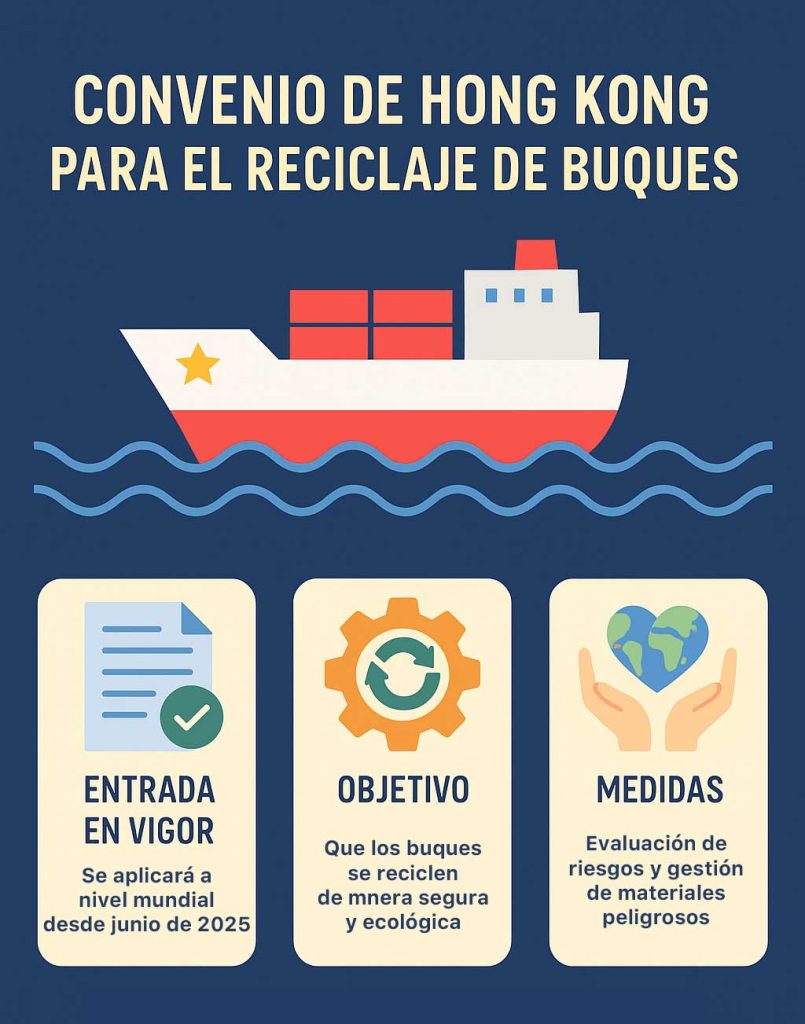
The Hong Kong Convention for the Safe and Environmentally Sound Recycling of Ships brings the global maritime industry into a new era of environmental responsibility.
Approved by the International Maritime Organization (IMO) in 2009 and scheduled to enter into force in June 2025, this treaty establishes a global legal framework to ensure that ships reaching the end of their operational life are recycled without endangering human health or the environment.
Somos provisionistas generales de buques
Descubre todos nuestros servicios de suministros navales y marítimos.
What is the Hong Kong Convention?
The Hong Kong Convention is an international treaty designed to improve conditions for ship recycling, an activity that has been marked for years by poor practices, exposure to hazardous materials and environmental pollution.
The agreement establishes legal requirements for:
- The design, construction, operation and preparation of vessels.
- The management and treatment of hazardous materials on board.
- Working conditions and safety in recycling yards.
Once it enters into force, all ships over 500 GT sailing under the flag of a signatory State, or entering ports of those States, must have an updated and approved Inventory of Hazardous Materials (IHM).
Impact on ship recycling: an industry in transformation
Until now, much of the ship recycling has been concentrated on South Asian beaches (Bangladesh, India and Pakistan), where labor and environmental conditions have been the subject of strong international criticism.
With the entry into force of the agreement:
- Informal and unregulated recycling is prohibited.
- Only certified and licensed shipyards may receive vessels for scrapping.
- Documentary transparency and traceability of hazardous materials is promoted.
- The training and protection of workers in the sector is improved.
This represents a paradigm shift towards a circular and sustainable model, reducing the end-of-life environmental footprint of ships and improving the image of the sector.

Case studies: how does the operation change for shipowners and shipyards?
Case 1: European shipowner with 25-year-old vessel
A European-based shipping company decides to retire a 25-year-old container ship. Before sending it for recycling, it must:
- Request an evaluation of the Hazardous Materials Inventory.
- Choose an approved shipyard in a country that has ratified the convention.
- Submit the recycling plan to the flag State for approval.
This implies a higher initial cost, but guarantees legal certainty and environmental compliance.
Case 2: Shipyard in Turkey
A Turkish shipyard, which already complies with EU regulations and is registered on the IMO’s list of approved facilities, becomes a preferred recipient for international shipowners seeking compliance.
- Thanks to your certification, you gain access to new business opportunities.
- It must maintain an exhaustive control of hazardous waste and working conditions.
Relationship with other regulations
The Hong Kong Convention complements other regulations such as:
- EU Ship Recycling Regulation (EU Ship Recycling Regulation), in force from 2019.
- International Labor Organization (ILO) standards on occupational safety.
It also aligns with the objectives of the European Green Pact and the transition to a sustainable blue economy.
Challenges and opportunities for the sector
Challenges:
- Increased administrative and documentary burden for shipowners.
- Adaptation of shipyards to new technical standards.
- Need for technical and environmental training of personnel.
Opportunities:
- Improved corporate reputation and ESG compliance.
- Access to European subsidies or incentives for green shipyards.
- Generation of quality employment in port areas.
Conclusions
The entry into force of the Hong Kong Convention marks a turning point in the way the maritime industry manages the end-of-life of its assets. This new legal framework obliges us to act responsibly, but also opens a window of opportunity for those who are committed to sustainability and modernization.
In an increasingly regulated and demanding industry, adapting to these new regulations is not an option, but a strategy for the future.
Do you need to know more? Contact us and we will advise you on the subject.




